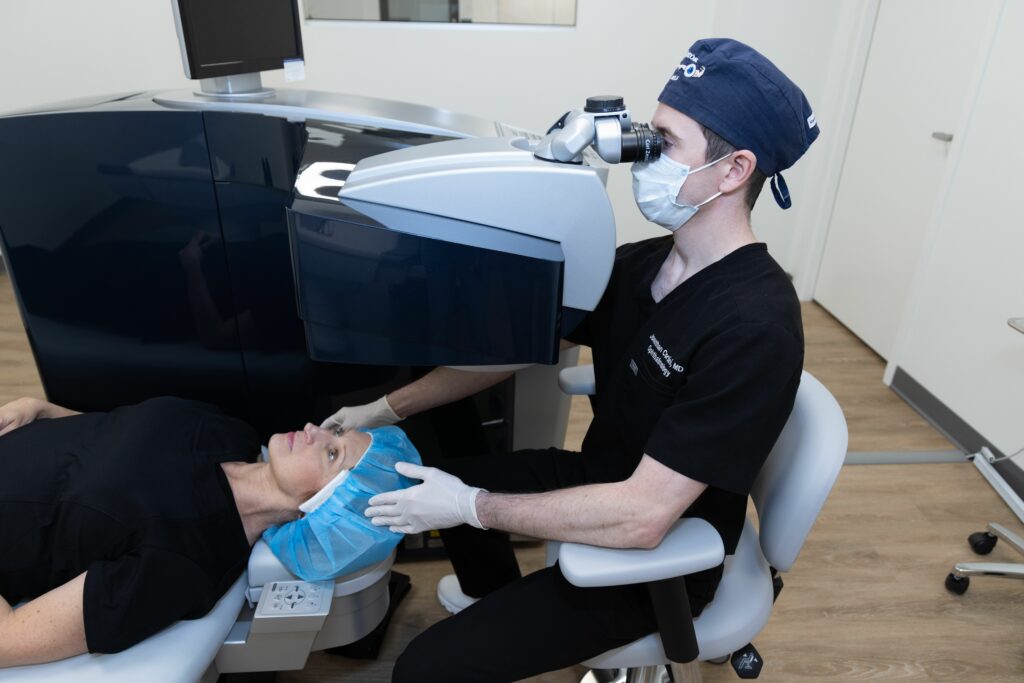Experience, LASIK, Safety, Surgery

LASIK (Laser-Assisted In Situ Keratomileusis) surgery is a popular procedure for correcting vision problems such as myopia (nearsightedness), hyperopia (farsightedness), and astigmatism. It is so popular that over 30 million procedures have been performed. While the surgery itself is quick and painless, the thought of undergoing eye surgery can cause anxiety for many patients. To help alleviate this anxiety, many ophthalmologists – including Dr. Corsini – prescribe Valium (diazepam) before the procedure. This blog post will explore why Valium is used for LASIK surgery, how it works, and what patients can expect.
Will I Be Awake During LASIK?
Yes. You do not need to “enter twilight” or be “put to sleep” to undergo LASIK. This is one of the reasons that LASIK is such a quick and popular procedure. It is helpful that you remain awake so that you can follow your surgeon’s instructions to look right at the target light during surgery. But don’t worry; the laser and the surgeon have simple ways to keep your eye looking straight ahead to ensure a successful surgery.
Although you will remain awake during surgery, Valium helps you stay relaxed and comfortable throughout your LASIK procedure, which takes about fifteen minutes.
Why Valium is Used for LASIK Surgery

- Anxiety Reduction: The primary reason LASIK surgeons use Valium is to reduce anxiety. The idea of having a laser operate on your eyes can be nerve-wracking, and even a minor amount of anxiety can make it difficult for patients to remain still during the procedure. Valium helps to calm your nerves, ensuring you stay relaxed and cooperative.
- Muscle Relaxation: Valium has muscle-relaxing properties. By reducing muscle tension, it helps you avoid involuntary movements, which is crucial during a precise procedure like LASIK.
- Enhanced Comfort: While LASIK is painless, the pressure sensation from the suction ring used during the procedure can be uncomfortable. Valium enhances overall comfort and makes the experience a breeze. At Corsini Laser Eye Center, we always perform all-laser LASIK (no blades), and our Visumax laser is the gentlest LASIK laser on the planet, further ensuring a seamless and pain-free experience.
How Valium Works
Valium belongs to a class of medications called benzodiazepines. It works by enhancing the effects of a neurotransmitter called gamma-aminobutyric acid (GABA) in the brain. GABA inhibits specific brain signals and decreases nervous system activity, which results in a calming effect on the body and mind. This calming effect is what helps to reduce anxiety and muscle tension in patients undergoing LASIK surgery.
What to Expect When Taking Valium for LASIK
- Pre-Procedure Instructions: Your ophthalmologist will provide specific instructions on when to take Valium. At Corsini Laser Eye Center, we provide you with your Valium in the office, so you don’t have to make a separate trip to the pharmacy. After you sign your consent – a step always performed without the influence of drugs such as Valium – Dr. Corsini will hand you your pill and a drink of water.
- Effects: You will usually start to feel Valium’s calming effects within 15 to 30 minutes of taking the pill. Patients often report feeling relaxed, slightly drowsy, and less anxious. These effects help in making the patient comfortable and steady during the procedure.
- Supervision: Because Valium can cause drowsiness and impair coordination, patients must have someone accompany them to the surgery and drive them home afterward. Patients should avoid operating machinery, driving, or engaging in activities that require full alertness until the effects of the medication have worn off. But don’t worry; most patients can drive within twenty-four hours of surgery.
- After the Procedure: The effects of Valium can last for several hours, so it’s important to plan for a restful period post-surgery. Patients are advised to go home and rest for the remainder of the day, avoiding strenuous activities and following any additional post-operative care instructions provided by their ophthalmologist.
Safety and Considerations
While Valium is generally safe for most patients, there are some considerations and potential side effects:
- Allergies and Interactions: Inform your doctor of any allergies to medications and any other drugs you are currently taking. Valium can interact with other medications, which may influence its effectiveness or increase the risk of side effects.
- Medical Conditions: Discuss any pre-existing medical conditions with your ophthalmologist. Conditions such as glaucoma, liver disease, or a history of substance abuse can affect the suitability of Valium for you.
- Side Effects: Common side effects include drowsiness, dizziness, and sometimes a slight headache. These effects are usually mild and temporary but should be monitored.
- Addiction: Benzodiazepines have addictive potential. Please inform your ophthalmologists if you have any history of drug or alcohol addiction.
What if I can’t take Valium?
Rarely, patients cannot take Valium for health or allergy reasons. Your surgeon will discuss other pharmaceutical options to aid relaxation during surgery, such as Benadryl (an antihistamine that enhances drowsiness). A skilled surgeon will employ “verbal anesthesia” – the ability to sooth patients by calmly speaking with them throughout the surgery. Dr. Corsini also lets you pick your musical playlist to allow customized comfort.
Conclusion
Valium plays a beneficial role in LASIK surgery by reducing anxiety and ensuring that patients remain calm and still during the procedure. If you are considering LASIK and have concerns about anxiety, talk to your ophthalmologist about the use of Valium and whether it is appropriate for you. By understanding its role and following simple safety guidelines, you can have a more comfortable and successful LASIK experience.
Want to learn more about the LASIK experience? Follow us @corsinilasereye. Thanks for reading!
Jonathan Corsini, MD


